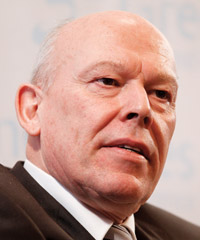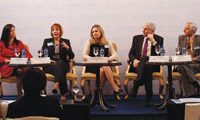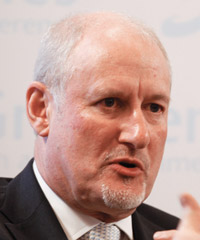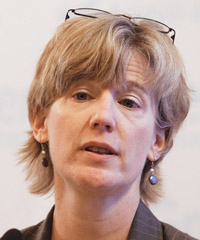Main Story
European Commission chief hints at ETS flexibility
But if ICAO drags its feet EC may turn to WTO, risking trade war, says Jos Delbeke, Director General, Directorate General Climate Action
March 1st 2013
The European Commission (EC) may have ‘stopped the clock’ on its controversial emissions trading scheme for aviation, but another timepiece is rapidly ticking towards the deadline for the International Civil Aviation Organization (ICAO) to find a global solution for aviation’s environmental impacts. Read More »When 160 industry delegates met in Hong Kong last month for Orient Aviation’s 5th Greener Skies aviation and environment conference, one of the EC’s most senior officials held out hope for success, but hinted it would use a bigger stick if no solution was found.
 |
| 'We have great hopes as we always had that ICAO is going to deliver a solution, but it may not be able to deliver that solution on its own' |
| Jos Delbeke Director General Directorate General Climate Action, European Commission |
The European Commission does not necessarily require a final agreement on a global emissions trading scheme (ETS) for aviation at the crucial International Civil Aviation Organization (ICAO) Assembly next September to prevent it re-starting the clock on its controversial ETS. That was the clear indication from the EC’s director general Directorate General Climate Action, Jos Delbeke, when he spoke at the 5th Greener Skies conference late last month.
What was important, he explained, was to “agree where we are going in the long term and I would hope very much that we are able to make an in-principle decision, which implies a decision on the core elements and a timeframe for implementation”.
That was the good news. At the same time Delbeke, who is Belgium’s representative on the ICAO high level committee that is trying to work out a solution to take to the Assembly, issued a clear warning that if a way forward was not found the EC would be more than happy to take the issue to the World Trade Organization (WTO), the forum for settling trade disputes.
“I am afraid these discussions might shift away from ICAO to other arenas such as the WTO and that would not be a helpful development. But we are willing to go that way if there is no other solution,” he said.
Brussels suspended the ETS – at least for international airlines - late last year in the face of worldwide condemnation, but has vowed to re-introduce it if ICAO fails to come up with a global alternative.
Indeed, on the very day Delbeke was speaking the European Parliament Environment Committee voted to support the “stop the clock” move. It still requires the endorsement of a full parliamentary session in April, but has so much support that it is unlikely to be overturned.
Delbeke was speaking at Greener Skies 2013 just moments after a stern warning from China that no matter what happened at ICAO, or whatever the EC did in terms of its ETS, Beijing would refuse to participate.
That message was delivered at the conference by Wei Zhen Zhong, secretary general of the Chinese Air Transport Association (CATA) (see separate story). The U.S. also has made it illegal for its carriers to participate and other countries, including India, are threatening similar action.
It became clear during the conference that ICAO’s high level group is already navigating heavy weather in its efforts to find an acceptable path to a global solution. It has held only two meetings and won’t convene again until the end of this month, just six months before the ICAO Assembly.
 |
| Executive panel (from left): managing director environment and aviation policies. Boeing Commercial Airplanes, Julie Felgar; president Engine Alliance, Mary Ellen Jones; vice-president environmental affairs, Airbus, Andrea Debbane; director general and CEO IATA, Tony Tyler; chief executive, Cathay Pacific Airways, John Slosar |
Delbeke said there had been “good discussions, but progress is still far too slow compared with where we will have to land at the ICAO Assembly at the end of this year”.
Paul Steele, executive director of the Air Transport Action Group (ATAG), which represents the airline industry at ICAO, agreed progress was slow.
He said the whole issue continued to be “mired in politics” and discussion and negotiation would go on through the year and possibly beyond. It was a delicate balancing act between the EU and ICAO, added Steele. Much depended on how much progress the 192 ICAO member countries could make to satisfy the EU and avoid the ETS “snapping back” at the end of the year.
“My read is the EU might be willing to accept a few things that three or four years ago it wasn’t. If there was an agreement on a global approach where growth beyond 2020 was going to be covered to a large extent, they would probably find that palatable,” he said.
In his keynote address to the conference, International Air Transport Association (IATA) director general and CEO, Tony Tyler, said Europe’s decision to stop the clock on its ETS presented a “tremendous opportunity” because it defused a potential trade war and avoided the fragmentation of the industry’s global strategy for reducing emissions.
“International tensions had been building in opposition to the EU’s extra-territorial approach to including international aviation in its ETS. Stopping the clock allowed governments to focus their attention on finding a global way forward through the processes of the ICAO,’ said Tyler.
“Work is going on in earnest to prepare such a solution. This is all positive. But we should not be lulled into thinking that a global deal will be easy.”
Cathay Pacific Airways chief executive, John Slosar, also acknowledged the move by the EU to stop the clock as positive. “It’s no secret most of the aviation community were not supportive of their proposed unilateral scheme because amongst its many flaws it moved the world towards a patchwork of uncoordinated, potentially over-lapping regulations that would ultimately lead to inefficiency and probably produce more harm than good,” he said.
 |
| 'The EU might be willing to accept a few things that three or four years ago it wasn’t' |
| Paul Steele Executive Director ATAG |
“But that risk is behind us now and we must as an industry focus on making positive progress. An industry solution must surely start with the industry itself.”
ICAO is exploring three options involving market-based measures (MBMs) for a global scheme: carbon offsetting, carbon offsetting with a revenue generating component and a full, global ETS.
In parallel to this, if states were unable to agree to a single mechanism that everyone could apply, ICAO was looking at how a framework - a rule book for states - could be developed if individual countries wanted to introduce their own MBM.
“It’s too early to back any particular horse,” said Steele. But he believed a straightforward offsetting mechanism where people bought credits to cover their growth post-2020 would be the simplest and quickest way to do it.
Tyler also said offsetting appeared to be the simplest to implement. “But, for any of the options, the devil will be in the details of implementation,” he said.
“We will be vigorous in reminding governments that aviation is a very competitive industry. Last year, the industry generated a net profit margin of just 1%. So it is critical that governments agree to a system that preserves fair competition.
“With razor thin margins, the consequences of even a small skewing of the competitive playing field could be severe.”
Andrew Herdman, director general of the Association of Asia Pacific Airlines (AAPA), pointed out the decision to stop the clock on the EU ETS may have been presented as a generous gesture, but it came with conditions and was only temporary.
He said a snapback would solve nothing because of the position of China, the U.S. and other nations which either refused to take part or their airlines did so under protest.
 |
| 'We are the most fuel efficient industry in the world' |
| Nancy Young Vice-President Environmental Affairs Airlines For America |
“That won’t change in a year’s time,” and the threat of a serious trade war over the issue would continue, he said.
Delbeke defended the EU’s action. “Let me underline that this is a very exceptional move that the EU has been taking. Normally, when legislation has been passed according to the strict provisions, such legislation has been and will be implemented,” he said.
“So the stopping of the clock is a deliberate act during a limited period of time to go into renewed negotiations and discussions. We are totally confident that we are going to get something meaningful on the table.”
Delbeke said it was “going to take us one year, not more, to solve the problem”.
“We have great hopes as we always had that ICAO is going to deliver a solution, but it may not be able to deliver that solution on its own … that is why the contribution by the industry sector itself may be a very important contribution to the work they are doing,” he said..
“We are discussing a framework that is leading us to the heart of the debate, but it is only an interim solution. The real solution is going to be a global approach to tackling greenhouse gas emissions.
“A global solution is going to have inevitably a part of a market-based mechanism so any work that is being done by the private sector to bring us further down the road of a market-based mechanism can be seen as a major constructive input into the debate.”
Delbeke made it clear there were minimum conditions to be met if Europe was to accept the framework. Mutual recognition by countries of any framework agreement and the geographical scope of its implementation were vital. Europe won’t accept any deal that limits MBMs to national airspace and excludes international airspace.
In other words, a scheme must be global and not limited to the airspace over individual countries.
Delbeke said the problem was not going to go away. “There is worldwide recognition that the problem of climate change is getting worse,” he said.
While aviation contributed only 2% of worldwide emissions, that was a significant figure, he added. According to the International Energy Agency, if the aviation industry did not step up its efforts, by 2050 it would be responsible for as much as 20% of emissions, said Delbeke.
Nancy Young, vice-president environmental affairs for Airlines of America, accused the EU and others of perpetuating a myth that if aviation doesn’t act it is going to be “this huge monster in terms of emissions growth. U.S. airlines improved their fuel efficiency so much between 2000 and 2012 that we decreased our overall emissions by 11%, but we moved 16% more passengers and cargo,” she said. “The international industry has taken this myth of exploding growth off the table.”
Young said MBMs were supposed to incentivize behaviour that wasn’t otherwise happening. “We are doing that. We are the most fuel efficient industry in the world and we are incentivized by our very business model to keep doing that.”
Delbeke said the debate in ICAO was not about the EU ETS, but about a global approach to greenhouse gas emissions.
“If all high level group members would take that line we would make much more progress,” he said.
One of the airline industry’s biggest concerns is that if governments start to implement their own emissions schemes the result would be a patchwork quilt of over-lapping measures.
That scenario would present another nightmare for international carriers. They would face an administrative jungle, having to pay for their emissions to multiple countries.
“This is not scaremongering,” said Steele. “The reality is that more than 40 countries have put some form of emissions related charges in place. They are raising well over $7 billion a year for national coffers and virtually none of it is being used for environmental measures. That’s why we urgently need to get a solution through ICAO.”
Delbeke said he had learned during Greener Skies that “we must avoid a patchwork of market based measures. We are, as you are, very worried about that. The outcome would be very sub-optimal. It would be very clumsy administratively speaking,” he said.
The path to a solution remains littered with potholes. If a guiding framework approach is taken it raises questions about states’ rights. Aviation agreements are usually bilateral in nature, but if a state signs up for the framework does this mean that when another signatory to the framework imposes a MBM on its airlines it then has no right of veto because it has already given consent?
The biggest issue, however, is how to deal with differentiated circumstances between states: recognizing that different states are at different levels of development in their aviation industry with some growing faster than others.
“How do you make sure that whatever you apply doesn’t penalize developing countries and doesn’t penalize the fast growth in those countries?” asked Steele. “Solving this issue is at the heart of the matter. Unless we can get developing countries to agree on the way forward it’s going to be very difficult to make any progress.”
Under the UNFCCC (United Nations Framework Convention on Climate Change) there are annex 1 countries, which are developed countries, and non-annex 1 countries.
“Some states within ICAO are trying to import that same classification of states into the aviation industry,” said Steele. “In aviation that just doesn’t work because we have some of the most developed aviation markets and industries in developing countries, such as Brazil, the UAE, Singapore, China and even Ethiopia.
“So the whole paradigm for international aviation is not the same as under the climate change discussions. What we are saying is we need an aviation solution to a climate problem and not a climate solution to an aviation problem.”
Tyler said that having recognized the process for governments to reach an agreement would be difficult, it was in the industry’s interest to provide as much support as possible.
“There is no perfect solution to level the burden. But an agreed industry position would aim to spread the burden as fairly as possible. And that is likely to be more palatable to airlines than a scheme exclusively designed by governments in the absence of airline expertise and experience,’ he said.
“The incredibly complicated and burdensome monitoring, reporting and verification (MRV) requirements of the EU ETS proposals are a clear example of how things can go terribly wrong when we leave it to governments to decide how we should run our businesses,” he said.
Tyler explained IATA’s role was to facilitate an agreement among airlines. It fully expected that technology, operations and infrastructure measures alone would provide the long-term solution for aviation’s sustainable growth.
“As such, MBMs will be a temporary gap-filling measure until the full impact of new technologies and sustainable biofuels can be realized. But even at that, the costs of MBMs to enable carbon neutral growth by 2020 (CNG2020) will be measured in the billions of dollars. So the industry is engaged in a robust discussion of all the options,” he said.
“Compromises by all will be required. I am convinced, as is our board, that an agreed compromise among airlines — in other words a united position — will stand the best chance of getting a fair deal on MBMs. The next few months will be critical in this process.”